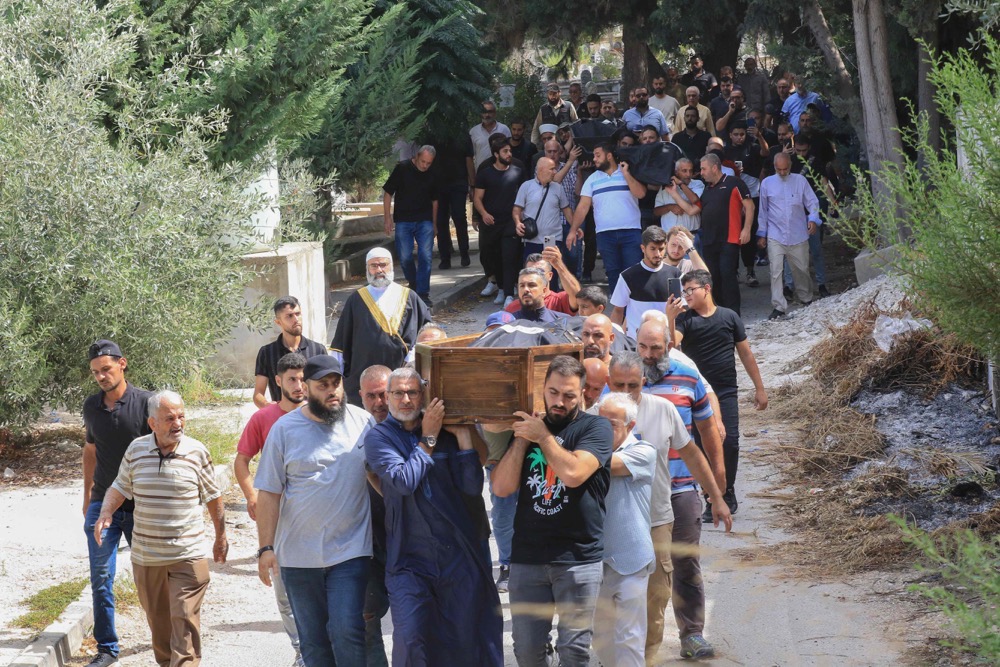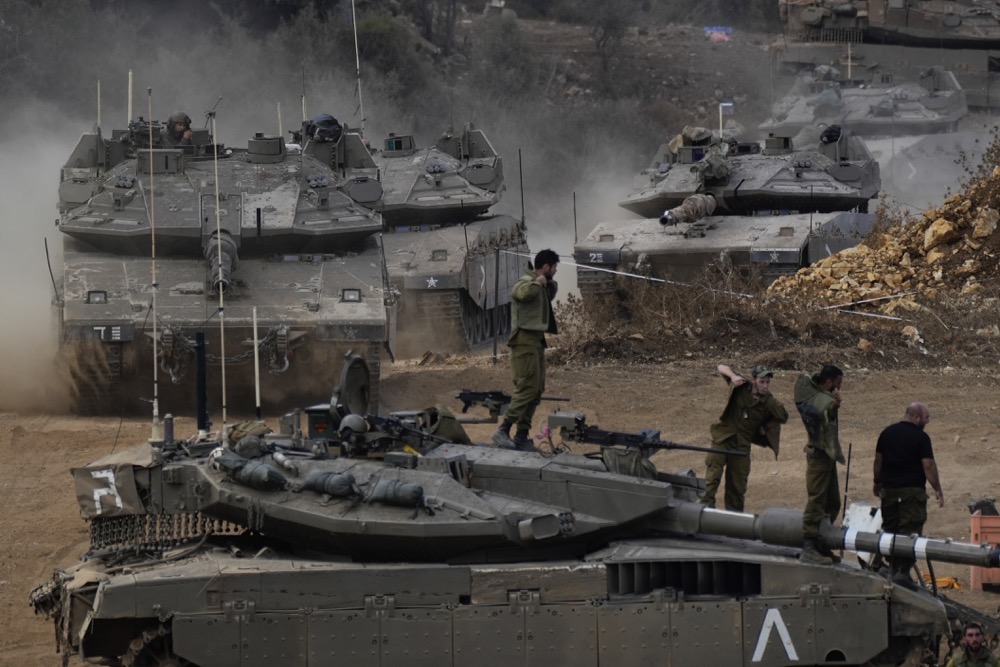DUBAI/LONDON: Following the killing of Hezbollah’s longtime leader, Hassan Nasrallah, in a targeted airstrike on Sept. 27, Israel is reported to have launched what it calls a “limited” ground incursion into Lebanon.
On Tuesday night, Iran fired a wave of ballistic missiles at Israel in a long-expected retaliation for the killing of Nasrallah and the suspected Israeli killing of Hamas chief Ismail Haniyeh in Tehran on July 31.
Both developments have brought the region yet another step closer to the possibility of all-out war.

Rescuers dig through the rubble of a building, a day after it was hit in an Israeli strike, in Ain El-Delb. (AP)
Lebanon has witnessed its bloodiest month since the end of its civil war in 1990. According to the Ministry of Health, more than 1,000 people have been killed, 90,000 displaced, and up to a million people have fled their homes.
Emboldened by its early successes, Israeli military officials appear determined to press home the advantage.
In a statement, officials described their actions as “limited, localized, and targeted ground raids” in southern Lebanon aimed at dismantling Hezbollah’s military infrastructure, which they consider a threat to northern Israel.
The military said it was acting on “precise intelligence” targeting Hezbollah positions and infrastructure in southern Lebanon. “These targets are located in villages close to the border and pose an immediate threat to Israeli communities in northern Israel,” it said.
On Tuesday, the Israeli military called on residents in more than 20 areas of southern Lebanon to evacuate.

Mourners carry the bodies of victims killed in an Israeli air strike on the town of Ain Al-Delb. (AFP)
“The IDF (Israel Defense Forces) does not want to harm you, and for your own safety you must evacuate your homes immediately. Anyone who is near Hezbollah members, installations and combat equipment is putting his life in danger,” army spokesman Avichay Adraee said on X.
“You must head immediately to the north of the Al-Awali River,” near the coastal city of Sidon, Adraee added.
However, Hezbollah said that no Israeli troops had crossed over into Lebanon. “All the Zionist claims that (Israeli) occupation forces have entered Lebanon are false claims,” a Hezbollah spokesman said in a statement on Tuesday.
They added there had “not yet been any direct ground clash between (Hezbollah) resistance fighters and (Israeli) occupation forces.”
Opinion
This section contains relevant reference points, placed in (Opinion field)
The UN peacekeeping force in Lebanon also said on Tuesday that there was “no ground incursion” going on in the south of the country. UNIFIL spokesman Andrea Tenenti told AFP news agency there was “no ground incursion right now.”
Israeli officials want Hezbollah to withdraw its forces north of the Litani River, about 18 km from the Israeli border, which would allow displaced Israeli civilians to return to their homes near the border.
Firas Maksad, senior fellow at the Middle East Institute, believes there is likely more to Israel’s war aims. “The stated objective is to return some 60,000 Israelis to their homes in the north. However, what we’re witnessing is something much broader than that,” he told CNN.

“It is an attempt, perhaps, to redraw the balance of power not only in Lebanon but more broadly in the Levant and even perhaps in the region as it relates to Iran. And we’ve heard time and again that this might now very much include a ground component.”
Just what a “limited” invasion might entail, however, also remains unclear.
“In the Lebanese psyche in particular, but others in the region, too, that past Israeli land incursions and invasions into Lebanon were also dubbed as being limited, so there’s a lot of question marks and certainly a lack of trust as to how far this operation will go,” Maksad said.
The international community has repeatedly warned against further escalation, fearing it could plunge the entire region into chaos.
INNUMBERS
• 1,000+ Lebanese killed in Israel-Hezbollah clashes in the past two weeks.
• 1m Lebanese displaced by Israel-Hezbollah fighting so far.
During a recent visit to Lebanon, French Foreign Minister Jean-Noel Barrot urged both sides to agree to a ceasefire and resolve the conflict diplomatically, calling on Israel to “refrain from any action that could destabilize the region.”
Meanwhile, Lebanese Prime Minister Najib Mikati described the situation as “one of the most dangerous phases” in Lebanon’s history, stressing the need to implement UN Security Council Resolution 1701, which ended the 2006 Israel-Hezbollah war.
As the conflict intensifies, the US has bolstered its military presence in the region, sending “a few thousand” additional troops to ensure security and protect Israel if necessary, according to the Pentagon.
In Lebanon, reactions to the latest escalation are divided. Hezbollah supporters have welcomed the confrontation, while many others oppose being dragged into a war not of their making. For Karine, a 37-year-old mathematics teacher, the country is being held hostage by Hezbollah.

“I sympathize with the Palestinian cause. I even sympathize with Nasrallah’s supporters. But reason says you cannot drag the whole country into war due to the decisions of a few,” she told Arab News.
“Israel, while I consider it an abomination before God, has demonstrated incredible military might. We have been dealing with crisis after crisis since 2019, and we are not up for this fight. We are too exhausted.
“Even if Hezbollah wants to fight, thousands of their soldiers have been left blinded and without limbs. How are they to fire a gun without eyesight and fingers? Spare us.”
Nasrallah had previously declared that an Israeli invasion would provide a “historic opportunity” for Hezbollah to eliminate its enemies — a sentiment reiterated by his deputy, Naim Qassem.
In a televised speech, the first since Nasrallah’s death, Qassem vowed revenge, stating that “the resistance is ready” to confront Israeli forces.

Smoke rises over Beirut’s southern suburbs after a strike. (Reuters)
Despite the loss of its leader, Qassem insisted that Hezbollah’s arsenal remains intact and that the group has the resources it needs for the fight. He called for patience, assuring supporters that while the battle will be long, Hezbollah will ultimately emerge victorious.
However, Hezbollah’s closest allies, Iran and Syria, have been notably hesitant to intervene.
While Iran’s Supreme Leader Ayatollah Khamenei mourned Nasrallah, calling him his “dear Sayyed” and urged Muslims to stand by Lebanon against the “foul-natured Zionist regime,” the Iranian government has made it clear that it will not send troops to Lebanon.
The Iranian Foreign Ministry stated that “there is no need to send extra or volunteer forces” from Iran to Lebanon or Gaza, as “the fighters in both countries have the capability and strength to defend themselves against the aggression.”
Similarly, Syria’s President Bashar Assad has yet to provide any concrete aid beyond condemning Israel’s actions.

Mohanad Hage Ali, deputy director for research at the Carnegie Middle East Center, suggests that Hezbollah has realized it is largely on its own in this conflict.
“Israel’s actions were a message of deterrence to Iran,” Hage Ali told Arab News. “I don’t think Iran wants to join the conflict, given how it now understands Israel’s military capabilities.
“There has been an unexpected level of infiltration within the ranks of Hezbollah and it seems too deep for the organization to deal with. No one has been able to figure out yet where the leaks are coming from.”
He added: “Hezbollah exists as a frontline asset but now serves as a cautionary tale for Iran.”
Iran’s apparent reluctance to intervene on behalf of its Hezbollah ally could be costly in terms of its credibility.

On Tuesday night, Iran fired a wave of ballistic missiles at Israel. (AP)
“The lack of response from Iran is contributing to a lot of grievances among its Arab allies, particularly in Lebanon, even within the Hezbollah support base in the Shiite community, essentially asking and wondering whether they’ve been left out to dry, by themselves, without Iran coming to their aid,” Maksad said.
“I don’t think Iran will be coming to their aid. They understand that in any direct confrontation with Israel they are at a disadvantage. And so what we’ve been hearing, time and again, from Iranian officials is this commitment to support Hezbollah, to support the Lebanese and their various proxies, in their fight against Israel, but not to be dragged into it themselves. They see that as a trap that they very much want to avoid.”
On Tuesday evening, however, Iran mounted a response, firing a wave of ballistic missiles at Israel.
In April, Iran mounted its first direct attack on Israeli soil with a massive barrage of missiles and drones in retaliation for the Israeli bombing of the Iranian embassy in Damascus.
Although Israeli air defenses were able to destroy some 99 percent of the drones and missiles before they reached its airspace, the incident sent a strong message that Iran would respond if pushed.

This latest Iranian attack will again have sent a strong message of deterrence, but is unlikely to change Hezbollah’s fortunes on the ground in Lebanon.
Indeed, with its leadership decapitated, its communication networks compromised, and with potential leaks within its ranks in Lebanon and Syria, Hezbollah already appears to be on the ropes.
Much depends on how Iran chooses to respond in the long run.

Hezbollah supporters have welcomed the confrontation, while many others oppose being dragged into a war not of their making. (AFP)
“This is essentially the opening round of a 12-round match between Hezbollah, backed by Iran, on the one hand, and Israel,” Maksad said.
“And if we know anything from history (it) is that Israel is pretty effective at landing these strong opening blows, but Iran tends to play the long game.”










































